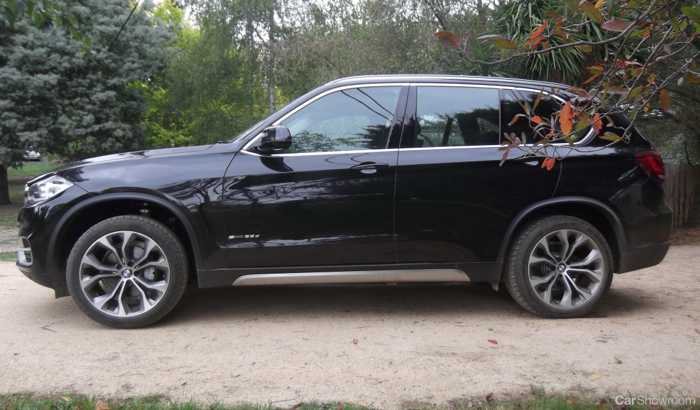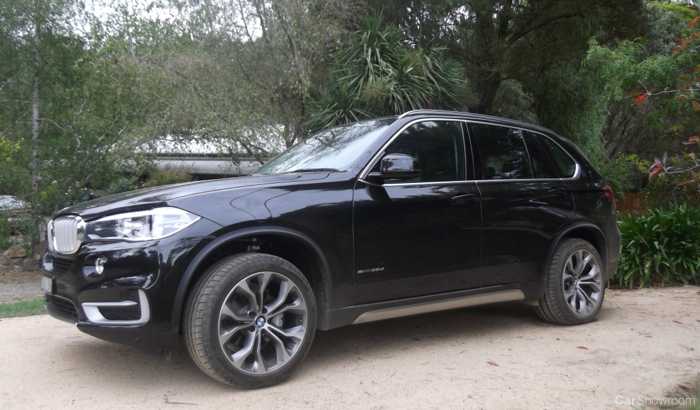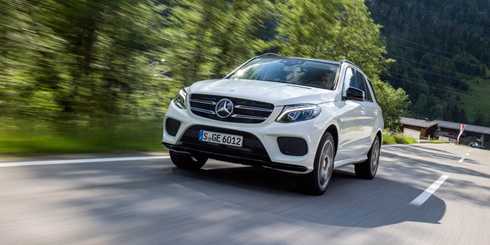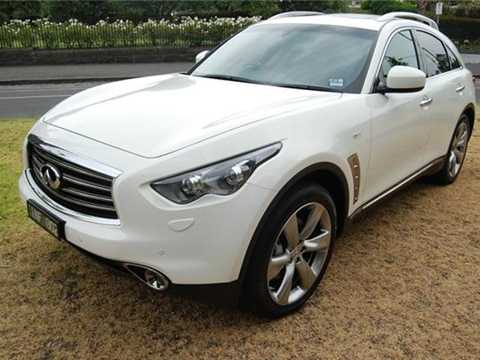Tennis ace John McEnroe famously yelled at a Wimbledon umpire: “You cannot be serious!” We were asking the exact same question in almost the same tone of voice when BMW delivered two BMW X5 25ds to the CarShowroom.com.au garage.
“Entry level model? You cannot be serious!” we said. So if you want to know what sensational value-for-money looks like in the metal, head down to your nearest BMW dealership and check-out the X5 25d.
As an addition to the all-new third generation BMW X5 model range, the 25d breaks new ground by being the first four-cylinder variant. That would be an awesome twin-turbocharged four-cylinder diesel which again underlines the excellence of BMW’s engine department.
Sure the range-topping 280kW/740Nm BMW M50d joins the 386kW/700Nm Mercedes-Benz ML63 AMG and the 250kW/800Nm Audi Q7 4.2 TDI as being the upper echelon high-performance European SUVs one aspires to, but back in the real world, we reckon the X5 25d has what it takes to keep the cash registers ticking-over nicely at BMW dealerships.
BMW X5 25d Overview
CarShowroom.com.au tested both BMW X5 25d models – the entry-level rear-wheel-drive sDrive25d ($82,900) and the all-wheel-drive xDrive 25d ($87,900). These are fresh additions to the third-generation X5 range which first appeared in March, some four months after the rest of the lineup debuted.
Looking at the inclusions such as Dakota leather seats with full electronic adjustment, Bi-Xenon headlights, LED fog-lights, 18-inch alloy wheels and the full suite of BMW high-tech driver aids…well, as we said, it’s hard to believe these are entry-level models. And the equipment levels certainly leave the previous generation entry-level X5 (the 30d) in the shade.
Underlining all of this is the excellence of the third-generation BMW X5 – the new looks, extra interior space and even sharper driving dynamics.
BMW X5 25d Engine
The first four-cylinder BMW X5 runs a common-rail, direct-injection, twin-turbocharged 2.0-litre, four-cylinder diesel engine. As you’d expect it bristles with state-of-the art technology including a smaller variable geometry turbocharger which gets things going at lower engine speeds before the main one kicks-in and piezo injectors which run up to 2000bar pressure.
Maximum power of 160kW is delivered at 4400rpm and peak torque of 450Nm is available between 1500-2500rpm. The sDrive25d drives the rear wheels while the xDrive25d is all-wheel-drive.
Both use BMW’s marvelous eight-speed Steptronic automatic transmission.
And both cover zero to 100km/h in 8.2 seconds.
Combined cycle fuel consumption is rated at 5.8l/100kms for the rear-wheel-drive sDrive 25d or 6.0l/100kms for the all-wheel-drive xDrive 25d. This comes about thanks to high-tech inclusions such as Brake Energy Regeneration, Auto Start/Stop, ECO PRO mode with coasting function and reduced rolling resistance tyres.
BMW X5 25d The Interior
Open the doors of the BMW X5 25d and, like us, you’ll be amazed you’re looking at the entry-level variants. Elegance, beautiful materials, space and obvious technology are part of the X5 tradition and the two 25d models don’t miss-out.
There’s the freestanding 10.25-inch Control Display linked to the iDrive system and there’s Dakota leather seats with the fronts featuring full electronic adjustment and either timber or brushed aluminium trim highlights. The beautiful leather-wrapped steering wheel affords electronic adjustment for rake/reach for an optimal driving position and view of the usual high-standard BMW instrumentation.
The rear seat provides 40:20:40 split folding for load-carrying versatility and the cargo space is 650-litres with the rear seat in-place or 1870-litres when completely folded (that’s 30l/120l up on the superseded model). For easier loading, the third-generation BMW X5 scores a Range Rover-like split, two-section tailgate whereby the lower section folds-down horizontally to form a single level with the cargo area floor – hence easier loading/unloading.
BMW X5 25d Exterior & Styling
As we know, BMW’s designers chose an evolutionary approach to styling the all-new, third-generation X5. But park one next to a previous generation model and you’ll soon pick substantial changes.
The third generation models, while sharing the sale proportions (short overhangs, upright A-pillars and long wheelbase), are definitely more muscular and sophisticated in their looks. BMW’s hallmark ‘kidney’ grille is elongated, there’s sharpness to the twin circular headlights and the front bumper is adorned with ‘X-shaped’ contour lines.
In fact the headlights feature flat bottoms and a LED accent light on-top. As well, LED fog-lights are standard.
And of course, this generation marks the X5 debut of BMW’s aerodynamic ‘Air Curtains’ with vertical inlets at the front guiding airflow around the front wheel-arches and sending it out via ‘Air Breathers’ in the front guards.
Speaking of aero – this generation BMW X5 also scores black air-channeling ‘Aero Blades’ as part of the roof spoiler.
At the rear, the two-section L-shaped tail-lights feature thin, three-dimensional LED light strips and the tail-gate is a two-section design.
BMW X5 25d On The Road
All-wheel-drive or two-wheel-drive you’re wondering? Well the X5 25d is a BMW so either way you’re up for a treat in the driving dynamics department.
And don’t worry about the 2.0-litre turbo-diesel. Matched to the glorious eight-speed automatic transmission, this thing hustles along as you’d expect an X5 to.
Freeway cruising was marvelously refined with the usual BMW absence of wind noise and the four-cylinder turbo-diesel virtually silent at low revs. Overtaking? Plenty in reserve at all speeds and nice response thanks to that brilliant twin-turbocharger system.
Thing is with all BMW X5s, they’re distinctly light, pointy, balanced and ‘un-SUV’ to drive. Would you expect anything less from BMW? And the X5 25d is no exception.
Pushed to the limit over our high-speed mountain roads test loop we did slightly prefer the more involved feel of the two-wheel-drive sDrive 25d. Like the Mercedes-Benz ML and Audi Q7 Quattro models, the all-wheel-drive BMW X5 25d introduces a smidge of understeer mid-corner and on exit when pushed to the limit whereas the two-wheel-drive version is just a little bit more ‘pointy’ (if that’s what you want in an SUV?).
Around town, there’s no disguising the BMW X5 is a 4886mm-long SUV so you become closely aligned with the high-quality reversing camera image when parking.
BMW X5 25d Challenges
Starting with a clean sheet of paper we did expect BMW’s stylists may have ‘pushed the boat out’ a bit more in the looks department.
BMW X5 25d Verdict
We remain huge fans of the BMW X5 and the addition of the entry-level 25d is a smart move.
The all-round excellence of the X5 25d - like the entire X5 range - is beyond question. Same for the driving dynamics.
But for the 25d you can add outstanding-value-for-money.
BMW X5 25d The Competition
Mercedes-Benz ML250 BlueTec is a worthy adversary for the BMW X5 25d. Priced at $83,500, you get 150kW/500Nm of Mercedes 2.1-litre twin-turbo four-cylinder diesel power, all-wheel-drive grip. Only a seven-speed automatic (eight-speed for the X5) and combined-cycle fuel consumption is 6.4l/100kms (6.0l/100kms for the 4WD BMW X5 25d).
While not on the same page for ‘prestige-ness’, Volkswagen’s $80,790 Touareg V6TDI presents some impressive stats. How does 180kW550Nm and fuel consumption of 7.4l/100kms sound? We’d say impressive and also add Volkswagen’s world-acclaimed production quality.






























